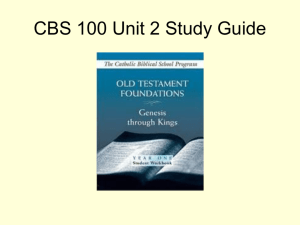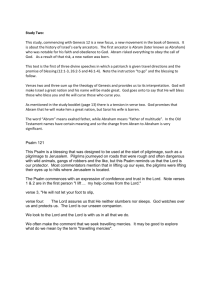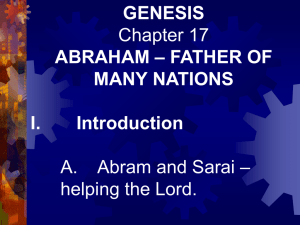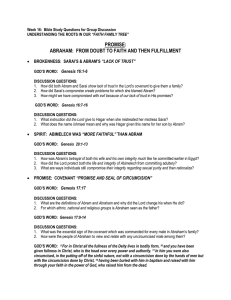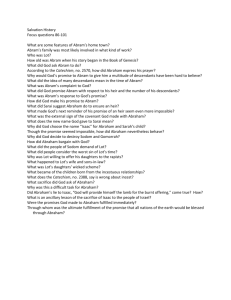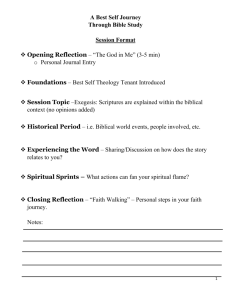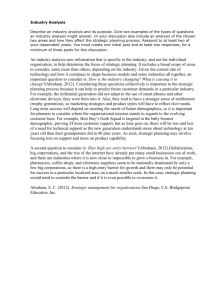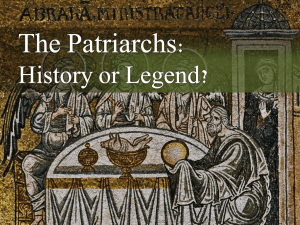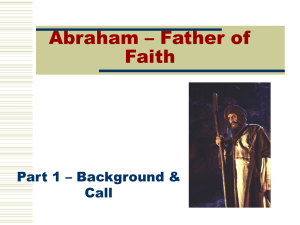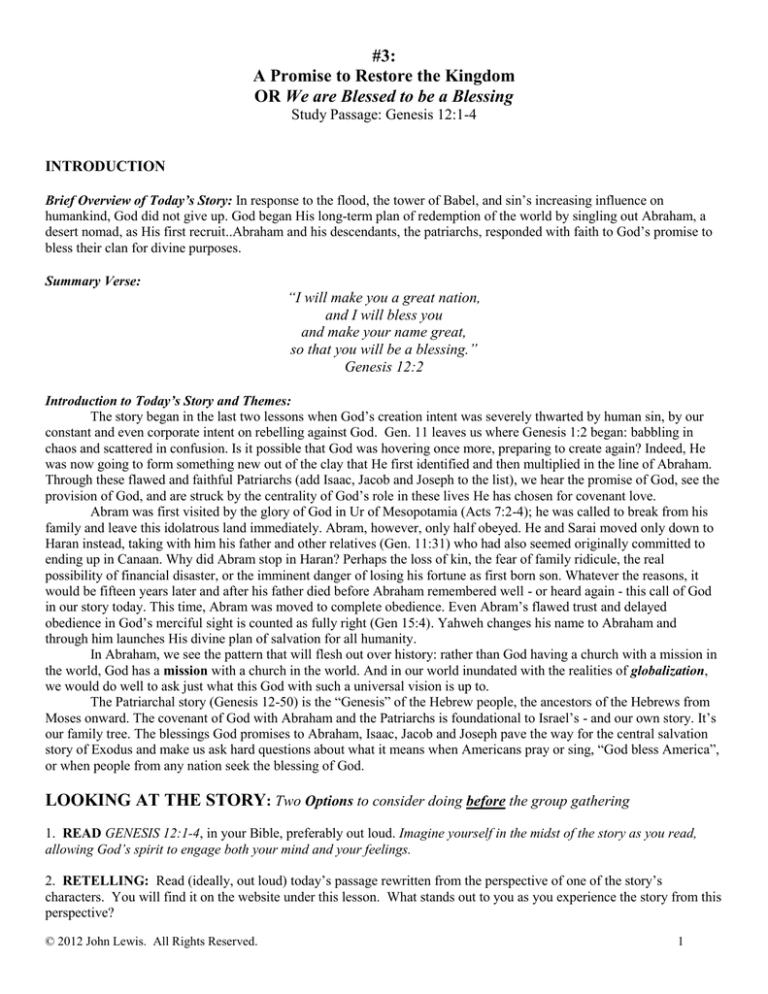
#3:
A Promise to Restore the Kingdom
OR We are Blessed to be a Blessing
Study Passage: Genesis 12:1-4
INTRODUCTION
Brief Overview of Today’s Story: In response to the flood, the tower of Babel, and sin’s increasing influence on
humankind, God did not give up. God began His long-term plan of redemption of the world by singling out Abraham, a
desert nomad, as His first recruit..Abraham and his descendants, the patriarchs, responded with faith to God’s promise to
bless their clan for divine purposes.
Summary Verse:
“I will make you a great nation,
and I will bless you
and make your name great,
so that you will be a blessing.”
Genesis 12:2
Introduction to Today’s Story and Themes:
The story began in the last two lessons when God’s creation intent was severely thwarted by human sin, by our
constant and even corporate intent on rebelling against God. Gen. 11 leaves us where Genesis 1:2 began: babbling in
chaos and scattered in confusion. Is it possible that God was hovering once more, preparing to create again? Indeed, He
was now going to form something new out of the clay that He first identified and then multiplied in the line of Abraham.
Through these flawed and faithful Patriarchs (add Isaac, Jacob and Joseph to the list), we hear the promise of God, see the
provision of God, and are struck by the centrality of God’s role in these lives He has chosen for covenant love.
Abram was first visited by the glory of God in Ur of Mesopotamia (Acts 7:2-4); he was called to break from his
family and leave this idolatrous land immediately. Abram, however, only half obeyed. He and Sarai moved only down to
Haran instead, taking with him his father and other relatives (Gen. 11:31) who had also seemed originally committed to
ending up in Canaan. Why did Abram stop in Haran? Perhaps the loss of kin, the fear of family ridicule, the real
possibility of financial disaster, or the imminent danger of losing his fortune as first born son. Whatever the reasons, it
would be fifteen years later and after his father died before Abraham remembered well - or heard again - this call of God
in our story today. This time, Abram was moved to complete obedience. Even Abram’s flawed trust and delayed
obedience in God’s merciful sight is counted as fully right (Gen 15:4). Yahweh changes his name to Abraham and
through him launches His divine plan of salvation for all humanity.
In Abraham, we see the pattern that will flesh out over history: rather than God having a church with a mission in
the world, God has a mission with a church in the world. And in our world inundated with the realities of globalization,
we would do well to ask just what this God with such a universal vision is up to.
The Patriarchal story (Genesis 12-50) is the “Genesis” of the Hebrew people, the ancestors of the Hebrews from
Moses onward. The covenant of God with Abraham and the Patriarchs is foundational to Israel’s - and our own story. It’s
our family tree. The blessings God promises to Abraham, Isaac, Jacob and Joseph pave the way for the central salvation
story of Exodus and make us ask hard questions about what it means when Americans pray or sing, “God bless America”,
or when people from any nation seek the blessing of God.
LOOKING AT THE STORY: Two Options to consider doing before the group gathering
1. READ GENESIS 12:1-4, in your Bible, preferably out loud. Imagine yourself in the midst of the story as you read,
allowing God’s spirit to engage both your mind and your feelings.
2. RETELLING: Read (ideally, out loud) today’s passage rewritten from the perspective of one of the story’s
characters. You will find it on the website under this lesson. What stands out to you as you experience the story from this
perspective?
© 2012 John Lewis. All Rights Reserved.
1
LISTENING TO THE STORY: Questions to do during the gathering
“Lord, after hearing the story with fresh ears, help us consider how the words, actions and feelings of the characters help
us authentically and briefly explore the questions below. Spirit, speak to our perceptions and misperceptions, to our real
experiences, to the realities of those we serve in our community.”
1. THE GOD QUESTION: What are several important and relevant ways God related to people? (Note: how does
God love - or even seem not to love - them? Why is this good news for the last, least and lost?)
2. THE KINGDOM RELATIONSHIPS: What are several important and relevant ways your character related to God,
people and/or the created world? (e.g. how do they love or not love, honor or mistreat them?)
3. LOOKING BACKWARDS AND FORWARD: What is a parallel you see in this story with an earlier story or a
Jesus story? What changes, what stays the same?
© 2012 John Lewis. All Rights Reserved.
2
LIVING INTO THE STORY: Optional – Pick one Action to take after the gathering
Be prepared to share with the class a short testimony from your experience
1. REFLECT – in writing
WRITE your reflections in your journal and ideally as a letter to someone in 2 or 3 paragraphs.
2. READ – what others have said
GO TO THE WEBSITE: Explore the “Featured Readings” or other resources (articles, poems, quotes,
stories, etc.) available there. Recommended: Click HERE to read the selection from Theirs is the Kingdom, by
Robert Lupton, associated with this lesson.
3. RESPOND – put faith in action
OBEYING GOD’S VOICE: Trusting that God has spoken to your heart during this week’s lesson, listen and
then commit now to doing a specific action for one or more persons this coming week. Write in below the
specifics - what, when, where. (Resource: any part of this lesson and ideas from the facilitator)
© 2012 John Lewis. All Rights Reserved.
3

